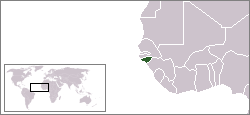United Nations Integrated Peacebuilding Office in Guinea-Bissau
| UNIOGBIS (until 2009 UNOGBIS) | |
|---|---|
| operation area | Guinea-Bissau |
| English name | United Nations Integrated Peacebuilding Office in Guinea-Bissau |
| Based on UN resolution | 1233 (April 6, 1999) |
| Other UN resolutions | 1580, 1876, 1949, 2030, 2048, 2092, 2103, 2157, 2186, 2203, 2267, 2343, 2404, 2458, 2512 |
| Type of mission | Peacekeeping Measures |
| Beginning | June 25, 1999 |
| management | Raisin Sori-Coulibaly from Burkina Faso , since May 2019 |
| Map overview |

|
United Nations Integrated Peacebuilding Office in Guinea-Bissau , UNIOGBIS for short , until 2009 United Nations Peacebuilding Office in Guinea-Bissau , UNOGBIS , is a UN mission to stabilize the African state of Guinea-Bissau .
history
After the first free elections in Guinea-Bissau's history in 1994, the government was overthrown in 1998 by the country's military. There were also clashes with rebel groups in the Casamance region in neighboring Senegal , which also spread to parts of Guinea-Bissau. In order to improve the situation in the country, which was politically unstable after independence, the UN Security Council adopted resolution 1233 of April 6, 1999 for the United Nations Peacebuilding Office mission in Guinea-Bissau. This started on June 25, 1999. Its tasks include the political dialogue between the conflicting parties, the monitoring of laws and the protection of human rights. The following measures were implemented in September 2003:
- Dialogue between all parties to the conflict
- Support and supervision for the orderly conduct of the elections of September 28, 2003
- Technical support for the elections by the UN
- Training of separate national police and military forces
- Program to contain and destroy acts of violence involving small arms
- Financial and logistical support to the government, development of economic and social programs
- Support in setting up administrative and judicial systems in the country
To this end, all political leaders in the country should enter into a joint dialogue. The military's influence on the country's judiciary since 1980 is to be abolished. The integration of the country into the West African economic community should noticeably stimulate the development of the country. Due to the slow development of the country, this mission has been extended several times, most recently with Resolution 2512 from February 28, 2019 to December 31, 2020. Since January 1, 2010 it has been operating as the United Nations Integrated Peacebuilding Office in Guinea-Bissau .
guide
| Surname | nationality | Beginning of the appointment | End of appointment |
|---|---|---|---|
| Raisin Sori-Coulibaly | Burkina Faso | May 2019 | in office |
| José Viegas Filho | Brazil | May 2018 | May 2019 |
| Modibo Touré | Mali | May 2016 | May 2018 |
| Miguel Trovoada | Sao Tome | June 2014 | May 2016 |
| José Ramos-Horta | Timor Leste | January 2013 | June 2014 |
| Joseph Mutaboba | Rwanda | February 2009 | January 2013 |
| Shola Omoregie | Nigeria | October 2006 | December 2008 |
| João Bernardo Honwana | Mozambique | September 2004 | September 2006 |
| David Stephen | United Kingdom | February 2002 | April 2004 |
| Nana Sinkan | Cameroon | 1999 | 2002 |
swell
- ↑ a b c d United Nations Integrated Peacebuilding Office in Guinea-Bissau (English), accessed on August 14, 2019
- ↑ Resolution 1580 (2004) Adopted by the Security Council at its 5107th meeting, on 22 December 2004 (English)
- ↑ Resolution 2512 (2020), adopted at the 8736th session of the Security Council on February 28, 2020
- ↑ UNIOGBIS guided tour (English)
Web links
- Official UNIOGBIS website (English)
